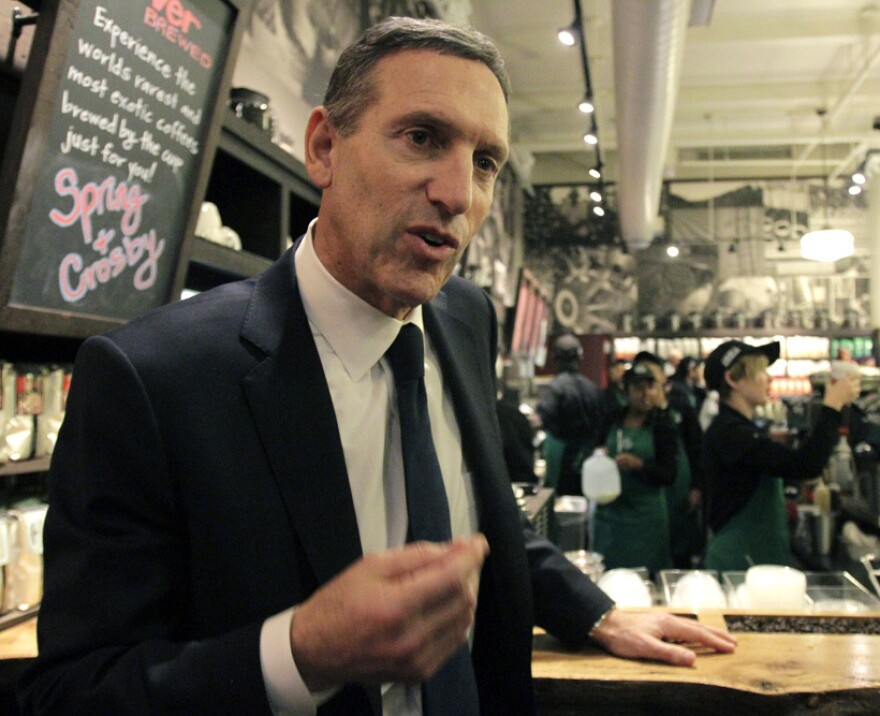In the world of business, where most CEOs come and go, a few go and then come back. Howard Schultz, the president and CEO of Starbucks, is one of them. When the giant coffee shop chain was faltering in 2008, Schultz returned to the helm to help save the company. Three years later, after an extensive transformation of the company, he has written a new book that details the journey to recovery, called Onward: How Starbucks Fought For Its Life Without Losing Its Soul.
"We needed to go back to the core principles of our company," Schultz tells NPR's Linda Wertheimer. Starbucks' mission was to "source and roast the highest quality coffee in the world and deliver it perfectly to our customers."
When Schultz returned as CEO in 2008, he took drastic measures to renew the company's commitment to its mission. In February of that year, he temporarily closed about 7,000 stores for several hours to retrain Starbucks employees.
"The unprecedented decision to literally close stores — which cost us millions of dollars — was done to ensure the fact that I demonstrated how serious and committed I was to making sure we go back to the core," he says.
The company needed to change the way it functioned, right down to the way they steamed their milk.
"You don't want to re-steam milk when you're making a perfect shot of espresso," Schultz says. "We were doing things like that, that produced a higher yield, a higher profitability, but I just felt it wasn't consistent with the commitment we've always had about making the perfect shot of espresso."
This small change might have gone unnoticed by many customers, but to Schultz, it reaffirmed Starbucks' commitment to excellence. And he didn't stop there. Since 2008, the company has re-evaluated many of its products — even "reconfiguring" its breakfast sandwiches.
"The breakfast sandwiches were selling extremely well, but at the time, there was an aroma in the stores that I felt was diluting the integrity of the coffee romance, and the aroma of coffee," Schultz says.

The culprit? Sandwiches cooking in the oven were causing the stores to smell like burnt cheese. So Schultz took the sandwiches off the menu, and introduced a new and improved product less than a year later.
"They've been more successful now than ever before," he says.
One of Starbucks' greatest challenges may be confronting its own success — and its ambitious expansion overseas.
"The question you have to ask yourself is: Can something get big and stay small?" says Schultz. Despite its ubiquity, Schultz says the coffee giant has sought to "create intimacy" among its employees and among its customers.
Unlike McDonald's, or other franchise systems, Starbucks owns and operates its own stores — and Schultz does not consider the company a fast-food business.
"[We] have created a relationship with our customers based on a very unique emotional relationship that goes beyond just being in the transaction business like a fast food company," he explains.
Although the company does use similar operational tools and resources, Schultz explains that Starbucks locations are distinguished by their connection to neighborhoods and communities.
"Not unlike the English pub in the U.K.," he says, Starbucks serves as a "third space between home and work, an extension between people's lives, at a time when people have no place to go."
Starbucks also stands by its commitment to provide health care to all of its employees, including those who are part-time.
"Last year, we spent over $250 million on insuring our people, because of health care costs. We've been doing that for almost 20 years and have faced double-digit increases almost every year," Schultz says.
The company is deeply committed to insuring workers, Schultz says, even in the face of increasing health care costs and despite complications introduced by the new health care bill. Starbucks is back on its feet, but Schultz insists that there is still room for improvement, and he intends to be the one to carry it out.
"Over the last three years, we've completely transformed the company, and the health of Starbucks is quite good. But I don't think this is a time to celebrate or run some victory lap," he says. "We've got a lot of work to do."
Copyright 2023 NPR. To see more, visit https://www.npr.org.



